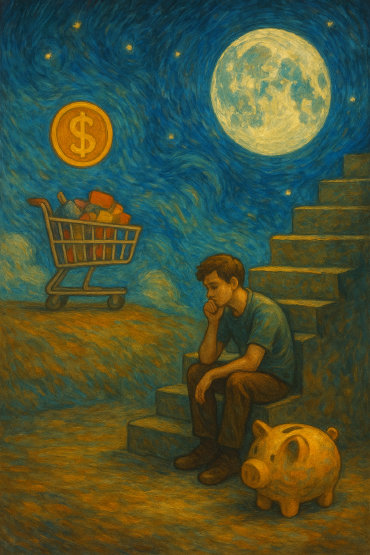The Aesthetics of Frugality or the Strategy of Survival
The meaning of the no-spend challenge
The "No-Spend Challenge" is not merely a campaign for consumer restraint. It can be seen as a symbolic question that reflects the economic anxiety, cultural shifts, and psychological tensions experienced in modern society. This challenge involves stopping unnecessary spending for a certain period and minimizing even essential consumption. However, it is not limited to simple frugality it represents a journey of self-reflection and an attempt to reclaim agency over one's life. Spread through social media, this movement has now become a cultural phenomenon. The act of practicing savings while documenting and sharing daily life goes beyond mere financial management, allowing individuals to affirm their self-efficacy through the virtue of thriftiness and express a longing for a meaningful life.
Spending-free challenge brought about by the change of the times
The no-spending challenge is not only a personal choice but also a reflection of structural changes in society. The COVID-19 pandemic has brought significant changes to the daily lives of people around the world and has created anxiety for many. The unpredictable future and the weakened job structure have transformed consumption from a simple choice into a survival strategy. Combined with the advancement of digital platforms, saving has become a means to express a new social identity that goes beyond mere financial issues. However, this form of frugality does not resonate the same way for everyone. For those in the middle class and above, 'voluntary simplicity' may be a choice, while for low-income individuals, saving can become a necessity. Therefore, the no-spending challenge can be understood as a mirror reflecting the reality of class differences.
The Nature of Moderation and Its Risks
Saving is fundamentally a wise way of life. It is a process of reducing unnecessary waste and finding inner peace by asking oneself what is truly needed. However, when moderation transforms into compulsion, life can become barren and powerless. Relying on others' perceptions and using 'how little one spends' as a measure of competition can lead to psychological fatigue and self-loathing. This phenomenon reveals not just individual psychological issues, but the fragility of social safety nets. In a society lacking trust in the future, saving becomes a natural skill for survival.
Discussion on social solidarity and basic income
It is now time to ask why we must exercise such restraint. The widespread prevalence of restraint is also evidence that the current social system is unsafe. In this context, we can emphasize the necessity of a basic income system. Basic income provides all citizens with an unconditional minimum income, serving as a foundation for individuals to choose their lives without the fear of survival. In a reality where no-spending challenges function as individuals' self-help measures, basic income can institutionally support this, alleviating social pain and helping individuals transform the meaning of restraint from 'enforced' to 'chosen.' Although basic income is not the main topic of this piece, it holds value as a clue to presenting a structural response to the anxieties of an era shaped by no-spending challenges.
The Future of the No-Spend Challenge and Our Role
The future of the no-spend challenge remains uncertain. This challenge could become the key to opening a culture of sustainable living, or conversely, it could turn into yet another self-improvement obsession that isolates individuals. To address this, we need to redefine the meaning of moderation. We should think about not just simple cost-cutting, but also more meaningful consumption and ways to save together rather than alone. The philosophy of saving should advance as autonomy rather than oppression, and this philosophy must be rooted in the solidarity and safety nets of society. As we pursue a wise life of sharing and living with all members of society, the questions posed by the no-spend challenge come to us more deeply and urgently.

Post a Comment